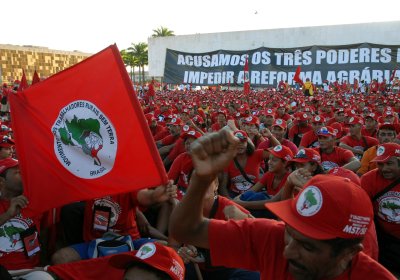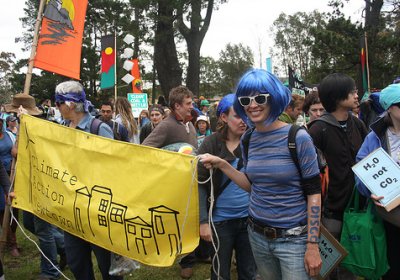Forty-five pro-democracy activists, students and trade unionists were arrested in Harare on February 19 at a meeting to discuss the uprisings in Egypt and Tunisia.
On February 23, the activists were charged with treason, which risks the death penalty.
It is believed that security forces loyal to President Robert Mugabe’s ZANU-PF infiltrated the meeting at the Labour Law Centre in Harare, which was themed “Revolt in Egypt and Tunisia: What lessons can be learnt by Zimbabwe and Africa?”
Simon Cunich
The debate around the Murray Darling Basin crisis has brought to public attention the need to rethink agriculture in Australia.
Today, sustainable food production is relegated to niche status — squeezed out by methods of farming that are seen to be more efficient. However, the efficiency of the dominant mode of agriculture relies heavily on chemical inputs for fertilisers, pesticides and herbicides.
This agriculture degrades soils, pollutes waterways and contributes heavily to climate change.
A University of Newcastle student group, the Fairtrade Club, has had a win: a campus cafe has agreed to serve Fairtrade-certified coffee.
The club formed earlier this year. It campaigns for shops and cafes at the university to sell fair trade products like coffee and chocolate. It also organises awareness-raising events, like “Fairtrade Fortnight”.
One of Australia’s biggest carbon emitters, Bayswater coal-fired power station in the Hunter Valley of NSW, will be the target of this year’s Camp for Climate Action.
Over December 1-5, the camp will bring people from around the country to a site near Bayswater, and will culminate in a mass protest against the proposed expansion of the power station.
The decade-long campaign against the Bickham coal project, north of Scone in New South Wales, ended in victory on May 14, when NSW Premier Kristina Keneally announced the government would reject the proposed mine.
The open-cut mine would have extracted 36 million tonnes of coal over 25 years.
Keneally's decision came after the May 3 publication of the state Planning Assessment Commission's (PAC) report, which recommended the mine not proceed.
It could be the first time the NSW government has ever blocked the development of a coalmine.
In August 1970, Resistance held its first national conference at the University of New South Wales. Bringing together young people from across Australia, the conference passed resolutions against the Vietnam War, in support of the rights of minority groups around the world and in support of the women's liberation movement. In the 40 years since, Resistance has been part of social movements that have had many victories.
More than 40 people marked International Women’s Day on March 8 with a celebration of women’s music at the Newcastle Resistance Centre.
Newcastle Resistance branch has entered a “sign war” against federal Labor MP Sharon Grierson.
A group of activists known as the “Newcastle 23” went before the Newcastle Local Court on January 19. The 23 are charged with “rail safety offences” on December 20, after they stopped a coal train in response to the failure of the Copenhagen climate talks to agree to adequate binding emissions cuts.
NEWCASTLE — Climate change campaigners have ridiculed the Australian Coal Association’s “cut emissions, not jobs” ad campaign, announcing their own campaign “to cut emissions, create jobs”.
In 2008, Tasmanian Premier David Bartlett promised voters the ALP state government would no longer guarantee financial support to forestry giant Gunns’ unpopular pulp mill proposal for the Tamar Valley, near Launceston.
Graham Brown, a retired coalminer from the Hunter Valley in NSW, kicked off a national speaking tour by telling a University of Sydney forum on August 12 that Prime Minister Kevin Rudd has “no clue whatsoever” about green jobs.
- Page 1
- Next page




